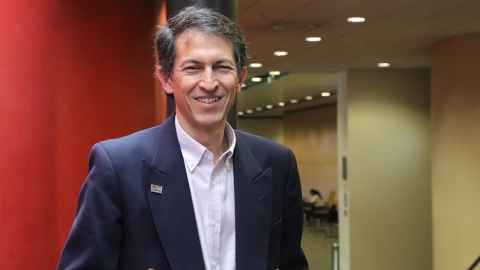Fernando Beltrán on reimagining personal data as currency
Associate Professor Fernando Beltrán shares his journey into research from Colombia to New Zealand.

Early days
“When I was about eight years old I remember walking down a street in Bogotá, Colombia, with my Grandpa. We met one of his friends and he introduced me by saying, 'Here's my grandson, and he’s going to be a scientist.' I'm not a scientist, but years after I made the connection: I like teaching and explaining things to people and finding answers in a systematic way. That memory of my Grandpa always warms my heart.
“After university in Colombia, I went to New York’s Stony Brook University to do my masters in operations research. I was devouring books and I stayed on to do a PhD in Applied Mathematics in Network Optimization, becoming interested in the telecommunications market. At that time, the mid-90s, the whole thing was changing. The only country that had a privatised telecom industry was the United States. There was a big push for everyone to start opening their markets.
That memory of my Grandpa always warms my heart.
“One issue that caught my attention was the idea that a public monopoly was becoming a private monopoly – and a private monopoly is dangerous to society when they start abusing their position. I became interested in the machinery that was emerging to regulate those monopolies. I started to deviate from my basic training and concerns and move towards economics, microeconomics, regulation, and policy.
A move to New Zealand
“After I finished my PhD, I returned to Colombia, working at a major telephone company and then moving to work at the university that I had graduated from. I ran some degrees, introduced courses, and opened up the area of regulatory economics.
“In December 2003, at a conference in NYU, I met the Head of Department of Information Systems at the University of Auckland. He had seen me present a paper and he asked if I would be interested in a position in Auckland. I applied and six months later, my wife and I moved here.
Research projects
“Most recently, I’ve been researching the areas of information, data privacy, and data pricing. We wanted to understand how much people’s bits of data and information about themselves are worth to them.
“People, institutions, and businesses are collecting your personal data to profit from it. You don't really know what's going to happen to your information. But when someone makes you aware, you just go, OK, but what can I do?
Our hope was – and still is – that individuals can negotiate the terms of selling their data and get money for it.
“If you consider a company like Meta that thrives on your personal data and you divide their annual revenue by the number of active users, you get around $60 per person per year. Meta and other companies make money out of your personal data, and what we found in our research was that people have never really thought about it.
“To answer the question 'How much would you charge me for your personal data?', we conducted experiments based on reverse auctions. We asked participants to provide various pieces of personal data and then tell us how much they would charge per piece. The winner was the person with the lowest bid/price (the value they placed on their piece of data). From this, we produced a couple of papers and a report, and attended a conference to present the results and gather feedback.
“What have we learned? One is on the legal side, where my colleague in Commercial Law, Gehan Gunasekara, was looking at who owns the data and what rights you have over that data. There are different approaches to that in different countries. The most advanced is what they do in the European Union, but there are other examples, like in New York and California, where they already have data privacy laws.
“There is one European data collector called Datum that has a completely different philosophy from the others. They pay you in cryptocurrency and allow you to have a say in what will happen with your data once it gets stored in their cloud services. Datum claims to have a more sustainable business and the fact that they use blockchain for security gives the data provider some peace of mind regarding what could happen.
“Another aspiration of this project is making people aware that [selling their data] is a real possibility, and that we should be more critical about that kind of business. Our hope was – and still is – that individuals can negotiate the terms of selling their data and get money for it.”